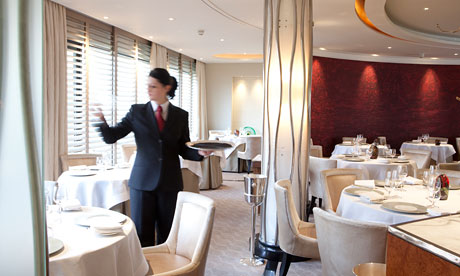
Petrus, 1 Kinnerton Street, London SW1. Tel 020 7592 1609. Meal for two, including wine and service, £225
Pétrus, Gordon Ramsay's newest venture, is a terrific restaurant in search of a menu. It has many virtues; sadly, the food isn't one of them. In no way is it actively bad. In places like this, I scan the menu for the car crash dish, the one created by the chef after a night on a Fernet-Branca bender, hellbent on uncorking the wellspring of creativity; the combination I don't want to eat but feel obliged to.
There are no such dishes on the Pétrus menu. Everything makes sense. Having eaten the food, that feels like a weakness. Safe can be good. Safe can be nice. But when the bill, courtesy of a shameful wine list, refuses to stick below £100 a head, you also want memories. Save for the few high points – a remarkable watercress soup, a clever scallop dish – mostly it's the culinary equivalent of beige: dull at worst, inoffensive at best.
I accept I find the name irritating. Ramsay has clung on to it, as though it's his brand, even though it is the marque of a great red wine; as I noted on this page a few weeks ago, there are restaurants all over the world using it. Secondly, the original Pétrus, though co-owned by Ramsay, was Marcus Wareing's baby. He was the one who gave it value. Wareing and Ramsay went their separate ways a while back and holding on to it looks like an attempt to cash in on someone else's efforts.
Enough. The good things. Retaining Jean-Philippe Susilovic, maître d' from the original Pétrus, was a smart move. He is one of those rare individuals who makes running a top-flight dining room look like a pleasure rather than a duty. There are some sillinesses in the service. They open the toilet door for you in such a manner as to make you fear they may also try to help with the zip, but they do eventually both warm and loosen up. Pétrus buzzes with the sound of people having a good time. The design of the room, a successful effort to bring curves into a space of corners, is very clever. The riot of cream and beige is broken by a womb-red span and in the middle by a glittering, transparent cylindrical wine store, so that one might almost be perched on a classy fairground carousel.
If only the food had all the fun of the fair, too. Jenga-like oblongs of crisp polenta served as canapés are a victory of the deep-fat fryer. Half are meant to taste of black olive, the rest of parmesan. Neither delivers on that promise. A white onion velouté is soothing and professional, if dangerously sweet. You will not leave humming its flavours. A starter of expertly cooked sweetbreads, a stew of choucroute below, a julienne of carrot above, is solid French cookery. Roast langoustine with watercress soup could knock the ball out of the park were it not that the langoustine were overcooked. Main courses are similarly ho-hum. What should be a killer combination, lobster tail and pork belly, delivers both ingredients monotonously. A duck dish is let down by meanness with the sauce. The best is a dish of scallops with caper berries and caramelised cauliflower which was brought unordered, as though the kitchen knew we'd missed their finest work. We insisted it be charged for.
At dessert, a hollow sphere of chocolate, which melts under a drizzle of hot chocolate sauce to reveal a scoop of milk ice cream, finally offers the theatrics one wants for this sort of money, as do petits-fours of vanilla ice cream balls covered in white chocolate and served over billowing dry ice – a bit of whimsy from Ramsay's flagship restaurant in Chelsea. Still, it all feels like too little too late.
The wine list is an act of violence. The cheapest wine is £25 and there is little else below £30. The cheapest Portuguese is £39; the cheapest Greek, £55. It tops out with a 1961 magnum of Pétrus at £49,500. Just the 12.5% service charge on that would be over £6,000, roughly the same bottle's retail price – an insulting mark-up.
All in all, the new Pétrus feels like an opportunity missed. Recently, Ramsay told this paper he'd been eating his way around the world to gather intelligence on the culinary cutting edge. It feels as if he then decided to ignore almost everything he'd learnt.

